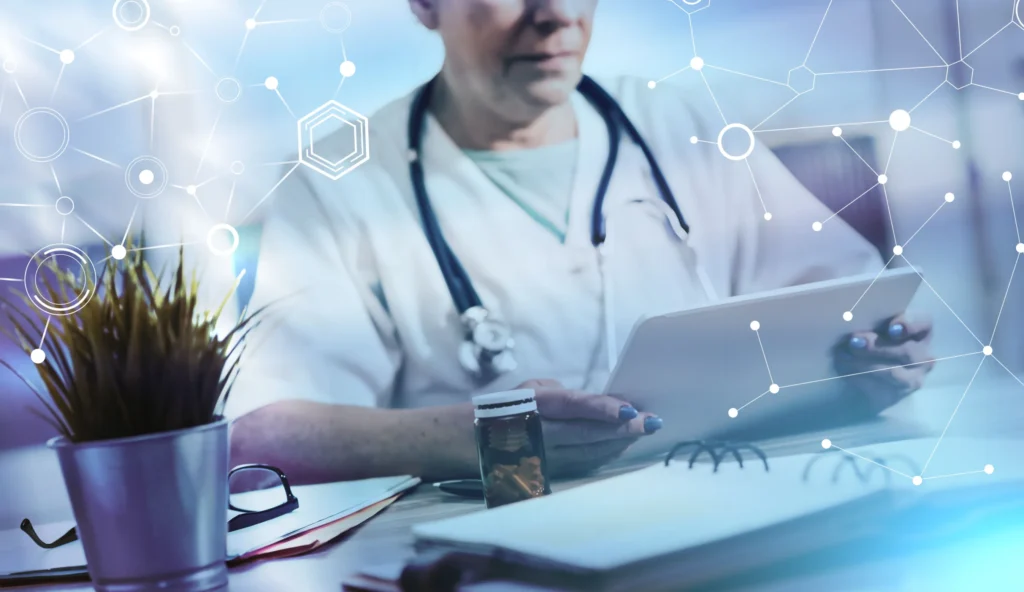Understanding AI Disease Prediction
AI Disease Prediction is transforming how healthcare identifies, monitors, and prevents diseases. Instead of waiting for symptoms to appear, artificial intelligence (AI) enables doctors and researchers to foresee potential illnesses before they become critical. This proactive approach combines machine learning, patient data, and predictive modeling to detect early warning signs that are often invisible to the human eye.
By using advanced algorithms, AI can analyze massive amounts of medical data — such as genetic information, lifestyle habits, and clinical history — to predict who might be at risk of developing certain conditions. This predictive capability marks a major shift from traditional healthcare toward preventive and personalized medicine.
How AI Predicts Disease
AI systems learn patterns from health data to forecast potential diseases. Here’s how it works:
- Data Collection: AI gathers information from various sources — medical records, wearable devices, diagnostic tests, and even patient behavior data.
- Pattern Recognition: Using machine learning, the system identifies hidden trends or irregularities linked to specific diseases.
- Risk Scoring: AI assigns a risk level to individuals, indicating their likelihood of developing an illness.
- Continuous Monitoring: As new data arrives, the system updates predictions, ensuring ongoing health tracking.
This continuous loop of learning and updating allows healthcare professionals to intervene early — before symptoms progress into serious conditions.
Applications in Healthcare
AI disease prediction is already being used across different areas of medicine, including:
- Cardiology: Detecting early signs of heart disease through ECG data analysis and lifestyle monitoring.
- Oncology: Identifying cancer risks using biomarkers and genetic indicators.
- Neurology: Predicting neurodegenerative disorders like Alzheimer’s years before symptoms show.
- Diabetology: Forecasting the onset of Type 2 diabetes through lifestyle and metabolic data.
- Infectious Diseases: Spotting outbreaks or patient vulnerability through population-level data.
These applications not only improve diagnosis but also reduce hospital admissions, treatment costs, and patient suffering.
Benefits of AI Disease Prediction
AI-driven prediction systems bring a wide range of benefits to both patients and healthcare organizations:
- Early Detection: Diseases can be spotted long before they become serious.
- Personalized Treatment Plans: AI helps design tailored therapies based on an individual’s data.
- Better Resource Management: Hospitals can prioritize patients who need immediate attention.
- Reduced Costs: Preventive care cuts down expensive emergency treatments.
- Improved Patient Engagement: Patients gain awareness about their health risks and are more likely to adopt healthier lifestyles.
By identifying risks early, healthcare providers can move from reactive treatment to proactive prevention — a true game-changer in modern medicine.
The Role of Machine Learning and Big Data
AI disease prediction relies heavily on two key technologies: machine learning and big data analytics.
- Machine Learning (ML): ML models continuously improve as they process more data. For example, an algorithm that predicts heart attacks becomes more accurate with every new patient record it analyzes.
- Big Data: Massive volumes of structured and unstructured data — from lab results to wearable sensors — feed these models, enhancing their precision.
Together, these technologies allow healthcare systems to identify subtle changes in health patterns, detect emerging risks, and recommend personalized preventive actions.
Ethical and Data Privacy Considerations
While AI in healthcare holds incredible promise, it also raises important questions:
- Data Privacy: How is sensitive health information stored and protected?
- Bias and Fairness: AI models can unintentionally favor certain groups if trained on unbalanced data.
- Transparency: Patients and doctors must understand how AI makes its predictions.
- Regulation: Ensuring AI tools meet medical safety standards is critical before deployment.
Responsible AI use requires strict data governance, transparent algorithms, and collaboration between technologists, doctors, and regulators to maintain trust and fairness.
Future of Predictive Healthcare
In the near future, AI disease prediction could become a standard part of every patient’s health journey. Imagine wearable devices that not only track heart rate but also alert you days before a possible cardiac issue. Or AI tools integrated into hospital systems that notify doctors when a patient’s risk profile changes.
Healthcare is moving toward precision prevention, where every individual receives insights tailored to their unique biology and lifestyle. As technology continues to evolve, predictive AI will help shift global healthcare from treatment-centered to prevention-driven systems.
Volv Global SA – Shaping the Future of Predictive Medicine
Volv Global SA, based in Switzerland, is a leader in applying artificial intelligence to revolutionize patient care. The company specializes in AI-powered disease prediction, biomarker research, and health data intelligence to identify diseases before symptoms emerge. With its innovative platforms, Volv Global helps healthcare providers improve diagnostic accuracy, streamline clinical development, and enhance patient outcomes. By turning complex data into actionable insights, Volv Global SA is driving the future of predictive healthcare — where prevention truly becomes the best cure.















Leave a Reply